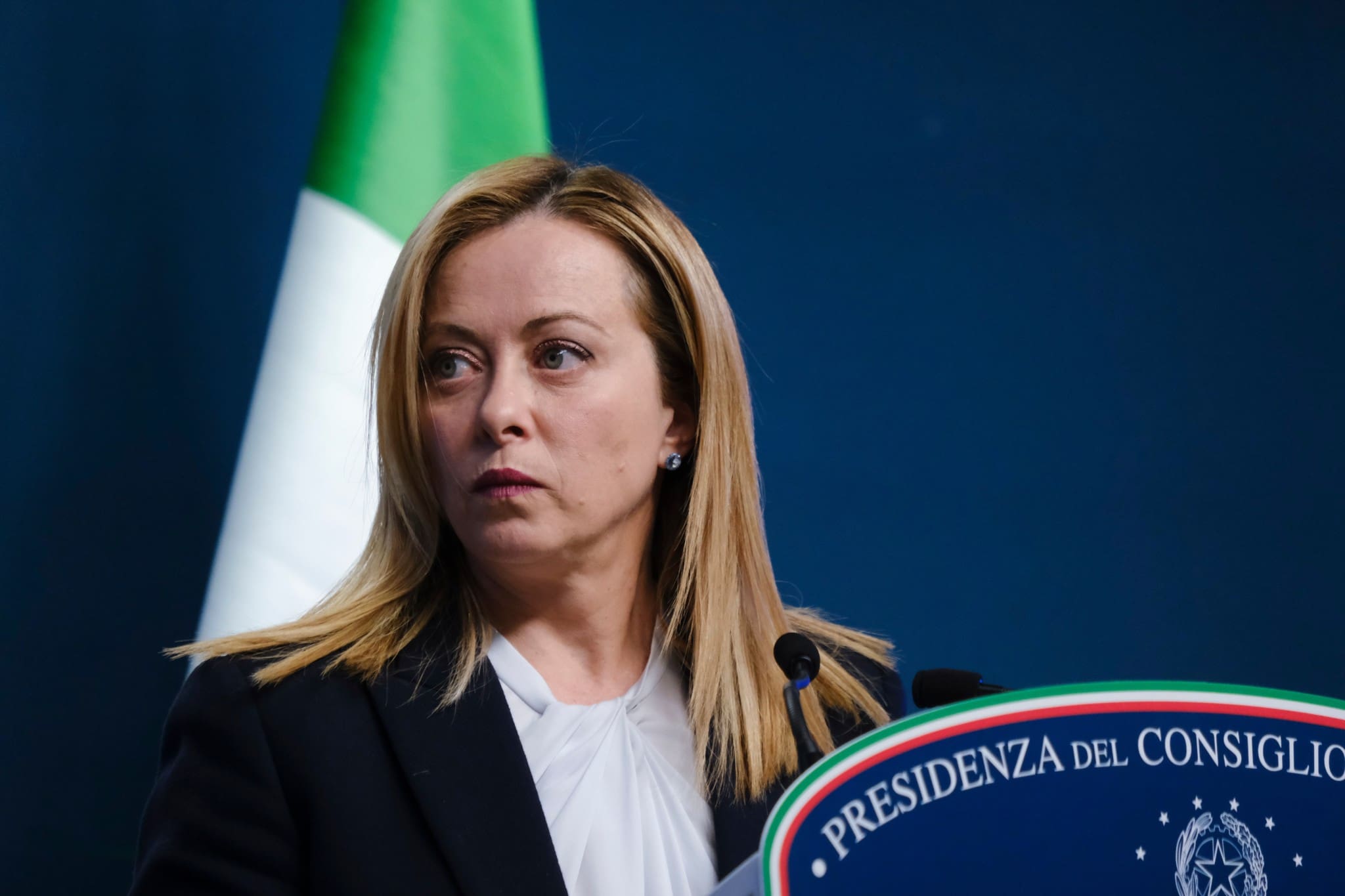Reacting to the migrant crisis in Lampedusa, Giorgia Meloni has now promised to create new closed migrant centers and expand the time during which migrants can be detained to 18 months. Do you think this will help solve the crisis? And why does Luca Zaia, the Lega president of the Veneto region, oppose these measures?
I don’t think these new measures will solve anything, they are small palliatives that will not solve the situation at all, because the situation can only be solved by stopping departures.
Giorgia Meloni won the election, and her party overtook Salvini’s League and became the leading party in Italy primarily because she repeated for months throughout the campaign that once she became prime minister, she would implement a naval blockade using the navy.
She eventually didn’t do it, explaining this would put Italy in conflict with the European Union. But she already knew that before the election, so she made a promise knowing that she could not keep it, and this has generated a lot of disappointment.
[pp id=93146]
It is true that implementing a naval blockade in the middle of the Mediterranean would be a risky operation. My personal thought, which I have expressed several times, including in my writings, is that the best solution would be to deploy mixed land patrols on the coasts of North Africa to prevent departures.
This would avoid any risk of accidents at sea. There would be no ship sinking and no drownings.
We should simply copy the system used by Britain and France. To avoid illegal landings on England’s southern coast, Britain conducts mixed patrols on France’s northern English Channel coast. These mixed patrols are now organized between a non-EU nation, Great Britain, and an EU nation, France.
We simply need to copy this model and implement it in Tunisia and Libya. It would be super simple and risk-free. We would probably have to somehow finance this operation and pay the Tunisians and the Libyans, but we already do that.
Italy already gives money to different countries and so does the European Union, as we can see with the example of Turkey, and so this money could be better spent to stop departures.
The new measure of 18-month detention centers will serve very little purpose because it won’t discourage departures. In addition, if you have a closer look at the law, it appears that this 18-month detention period will not apply to all those who arrive illegally, but only to those who commit criminal acts, are reported, and are convicted, so we are talking about a minority.
That’s why Italy’s regional governors of all political colors, from the right to the left, don’t want to host these detention centers. And it’s also because we know that people escape very easily from those detention centers, and they then pour into our cities.
Today, the law and order situation in Italian cities and even in small villages and towns has become untenable, because these people have a certainty of impunity, and this has been fueling an unprecedented degree of criminality.
In the past year, there has been an explosion of crime and violence, something never seen before.
Going back to your idea of having common patrols on the shores of Africa, the problem I see here is that you first need to get North African countries to agree to it.
In Italy, we say that if you pay, you can get anything or almost anything. Since the Tunisian and Libyan authorities say they are against the departure of illegals, it is hard to see why they should not accept this kind of proposal.
I am talking about mixed patrols, not some kind of colonial occupation, simply beach patrols with the presence of the local police or military, so why should they not accept?
Moreover, if we fund this kind of patrolling and if we also add some additional heavy funding, in the millions of euros, for the countries concerned, this is something Italy could do in total autonomy in the form of international aid, without asking the European Union. We can help these countries, and together we can try to stop the departures.
[pp id=92362]
This would prevent the controversies around a naval blockade. We all know very well that a naval blockade carries the risk of accidents at sea, and we also know very well that the European left and the media will readily exploit any such incident.
So, joint land patrolling on the coast of the countries of departure is the only possible solution, in addition, of course, to the solution that was already implemented when Salvini was interior minister, which is the solution of closed ports, which implies banning entry into our territorial waters and blocking the landing of illegals.
Salvini has paid a high price for his firm policies, and he is still on trial today for this. The League (Lega) and Salvini have kept their promises and are paying dearly for their consistency.
Meanwhile, our current prime minister promised firmness on the immigration issue, and instead, we find ourselves in a catastrophic situation, worse than any previous immigration crisis.
And by the way, Turkey does “security” containment operations in Syria where it occupies the north of the country. It doesn’t seem to me that the European Union has cut off relations with Turkey, saying they are illegal operations. Turkey justifies these operations as security operations, and, as far as I know, the European Union continues to fund Turkey with billions of euros.
So, the question is: If Turkey is allowed to do security operations on its borders, why couldn’t Italy be allowed to do security cooperation in North Africa, especially if these security operations are agreed upon with local authorities?
The League held a meeting in Pontida on Sunday, Sept. 17, where Matteo Salvini and his French host Marine Le Pen were very critical of Meloni. Do you think Le Pen was referring to Meloni when she talked about the cowardice of some leaders against immigration?
Honestly, I don’t think it was a reference to a person specifically, and I certainly don’t think it was a reference to Meloni. I think she was referring to the European political class in general because, frankly, none of those in government have a brilliant record in countering illegal immigration.
Although paradoxically, there are some countries ruled by leftist governments such as Spain, where the law and order situation and the policy for countering mass illegal immigration are better than in some countries ruled by the right.
For example, there are thousands of Moroccans who instead of migrating to Spain by crossing the Strait of Gibraltar, arrive in Italy by flying from Morocco to Turkey and then traveling by car through the Balkans. This is an unbelievable thing. A Moroccan who intends to cross into Europe theoretically would have to go through Spain, not fly to Turkey and go through all the Balkans to get to Italy.
This is very serious because it means that Italy is no longer a transit country for migrants, but is a final destination country.
It seems to me that what Spain has done well is that it has agreements with the migrants’ countries of origin. This is what Meloni has been trying to achieve too for Italy, don’t you think so?
It is not only this. Spain has a much stricter law on the expulsion of fake minors.
Did you know that there are now tens of thousands of people in Italy who declare they are minors while they are definitely over 20 years old and sometimes even over 30 years old? This gives them total impunity from a legal point of view, and it costs the community a lot of money. Such a fake minor costs over €100 a day for the local municipality. So, it is also an economic disaster.
Spain, on the other hand, rejects these fake minors, and the police in Spain are evidently more proactive and act more freely to ensure order than in Italy. As you say, Italy has tried to get a series of bilateral agreements. I must say that the Mattei plan that was presented by Meloni is very good. It is a very lucid plan geopolitically and would be very interesting if it worked.
Unfortunately, we have seen that the European Union – in the person of Josep Borrell, the EU representative for foreign affairs, but also the entire European left – has strongly boycotted the agreement sealed by Giorgia Meloni, Ursula von der Leyen and Mark Rutte with Tunisian President Kais Saied. They have gone out of their way not to give the promised money to Tunisia, and they have gone out of their way to get the International Monetary Fund (MF) not to give a loan as well.
So clearly this attempt by Meloni was a very positive one in my opinion and could have yielded some great results, but, unfortunately, it has clearly been boycotted at the Brussels level.
Meloni has also supported the new relocation scheme contained in the EU Migration Pact. The leaders of Central European countries, particularly Hungary and Poland, say this is going to be an additional pull factor for migrants, which is one of the reasons why they do not want to accept these relocations. What is your opinion on this? Who is right? Meloni or Orbán and Morawiecki?
As a matter of fact, I wrote several articles in different Italian newspapers about this issue in the past, some two or three years ago. I have always shared the Hungarian and Polish point of view in this area because it is clear that when we talk about relocation, we are actually talking about the potentially unlimited redistribution of illegal immigrants across the EU.
So, we will end up redistributing the whole African population because today we see that there is a system that is totally organized and run by the mafias who have become tour operators with these migrant boats that are towed to the NGO boats that take them to Sicily.
We are talking about numbers that are now huge, and what is happening in Lampedusa is just the tip of the iceberg. Most migrants actually enter Italy through the Balkan route. There are already thousands of people entering Italy from the Balkans every day.
[pp id=9287]
These are people who come through Turkey and enter Italy around Trieste or Gorizia. All those illegal immigrants would need to be relocated. It is about redistributing millions of people. In addition, knowing that there is a principle of relocation, potential migrants are incentivized to leave their country.
The truth is that those who accept relocation and those who refuse it view things very differently. The League, for example, is totally opposed to relocation. It wants to stop the departures because that is the only way this flow can be stopped.
This does not mean shutting ourselves in Europe like a fort and forgetting Africa. It means Africa should be helped in other ways, with funding, with help to build businesses in Africa, with schools, and with healthy cooperation.
And then it is also true that there may be legal immigrants with vocational skills who should be allowed in. However, today, those who do come do so illegally with the excuse that we need people to do menial jobs. But tens of thousands of young adventurers enter and of them, a very low percentage, perhaps less than 1 percent, then go on to work. All the others are out on the streets either doing nothing or committing criminal acts.
There is this mantra that is repeated that these young Africans or these young Muslims will pay pensions to the old Italians, but it is clear to everyone that they will not pay anything because these people are not working and are in fact a burden for Italian elders.
Those illegals who are now called guests have truly become guests. However, they are not paying guests; they are guests that we pay for.
The new mantra also says we need these guests to lift our demographics. So, we are importing millions of males from Africa to improve our demographics.
We all know what this means: It is a hidden form of population replacement, as Minister Lollobrigida has called it, triggering a series of reactions. But this is exactly what is happening. When in the newspapers we are always talking about old Italians and young energies from Africa, it is clear that this is the issue.
Don’t you think a problem Giorgia Meloni has with immigration is linked to the European Commission withholding Next Generation EU funds, the funds for the Italian post-Covid recovery plan? Perhaps the Meloni government is under financial pressure from Brussels not to be tough on illegal immigration the same way the governments of Poland and Hungary have had their share of Next Generation EU funds blocked because of the European Commission blackmailing them on different issues.
This is definitely the case with Italy as well. Certainly, the Italian government is being blackmailed by the European Union. However, we expected that a compromise would be reached. There is a Latin phrase that says Do ut des. I give you something so that you can give me something.
I believe that the Poles could teach us a lot in this respect. The Poles have sacrificed themselves, for example, to help Ukraine beyond all limits, but they also got in return more respect from the European Union and the world. We believed that given Italy’s great efforts — some on the Ukrainian front and some on the immigration front — the European Union would somewhat soften some of its diktats toward Italy. This has not happened.
So, it is certainly true that there is blackmail, but it is also true that Italy is not San Marino or Luxembourg and therefore, at the moment when it is being blackmailed, it should raise its voice and react harshly in the face of some of Brussels’ diktats.
I don’t think it’s heresy saying this because we see small countries like Malta which, on the migration issue, basically implement a policy of closed ports in defiance of any rule or any advice from the European Union, and we don’t see any furious reactions from the European Union against Malta. And so, it is not clear why Italy cannot in turn take initiatives, even if these initiatives are unwelcome in Brussels.
We still have important critical mass. It is often said that Italy is a second-rate country. However, it is also true that Italy is too big to fail, meaning that everyone needs to remember that if Italy falls, this will cause serious trouble for the rest of Europe as well.
We cannot continue to be treated as the doormat or dumping ground of Europa.
And what is your opinion of Giorgia Meloni? Where is the real problem with her policies? Why is she acting this way?
I think Giorgia Meloni could be a very good premier and she has good ideas.
I also think, however, that she somehow suffers from a kind of unjustified inferiority complex, which is the inferiority complex of many people who come from the right and feel that they always have to prove to the left that they are not too right-wing.
There is a constant search for some kind of promotion or “certificate of democratic good behavior” issued by the left.
In this chase for this certificate of good behavior, many good ideas traditionally belonging to the right are lost along the way or given up.
This is a futile chase, as this democratic certificate will never be issued by the left because the left will every day raise the bar by an additional centimeter. We are just losing energy, resources, and useful ideas.
I hope Giorgia Menoni realizes this as soon as possible and does what she said at the Budapest Demographic Summit in mid-September. She then professed great commonality with Orbán’s Hungary.
Let’s hope that she is really going to raise her voice, return to being that Giorgia Meloni of the campaign, and take an example from statesmen like Orbán and Kaczyński who push through their respective countries’ interests regardless of threats and diktats from Brussels.
I would also hope she gives more space to Matteo Salvini and the League when dealing with immigration.
I think it can be done, but it must be done immediately. Otherwise, it will be too late.
Max Ferrari is an Italian journalist working with Il Giornale d’Italia and a historical member of Salvini’s League. He is also a former director of the League’s TV network.





